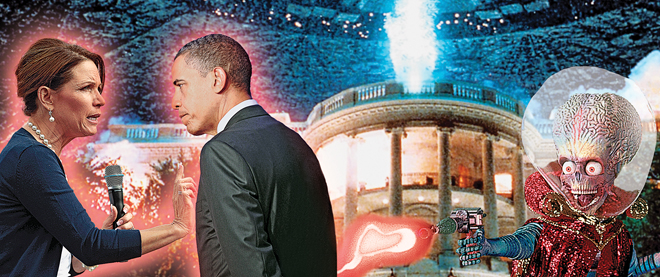When Mars really attacks
How would Americans handle an alien invasion in this time of partisan rancour?
Share

Economist Paul Krugman has found a novel way to illustrate his view that more stimulus is required to jolt the U.S. economy to life. “If we discovered that space aliens were planning to attack,” he said on CNN, “and we needed a massive buildup to counter the space alien threat?.?.?.?this slump would be over in 18 months.”
So it has come to this: the best hope for the U.S. economy is that Independence Day turns out to be a documentary.
But is Krugman right? In a time of unprecedented partisan rancour, how would today’s America really respond to an interstellar invasion?
Sept. 26, 2011—A sombre President Obama addresses the nation. He announces that a fleet of spaceships is rocketing toward Earth. Quick calculations reveal the alien home world would just now be receiving radio signals carrying the first album by Creed, so a declaration of war by the aliens seems certain.
Sept. 27—Military experts say the warships are heavily armed and likely to first target the United States, owing to the country’s unequalled array of monuments and buildings that would look awesome exploding.
Sept. 29—Obama proposes construction of the SuperRay, a massive weapon to which the alien spacecraft are believed to be vulnerable. Estimated cost: $3 trillion. Estimated number of Republican congressmen who execute a spit-take upon hearing this number: all of them.
Oct. 4—Republican opposition to the SuperRay gains momentum. “It’s just another example of big government sticking its nose into the survival of the human species,” Michele Bachmann says.
Oct. 8—Tea Party darling Rand Paul gives an impassioned speech insisting the best way to repel the aliens is to give the wealthy more tax breaks, or maybe a cool speedboat.
Nov. 24—After weeks of fruitless talks, Obama accidentally negotiates away two key bargaining chips while talking to himself in the mirror.
Dec. 9—Alien ships enter Earth’s atmosphere and begin destroying buildings and roads. The Republican party issues talking points highlighting how America’s urban infrastructure has crumbled under Obama.
Dec. 12—Sarah Palin officially launches her presidential bid, claiming she is best qualified to battle any and all alien invaders because she can see the moon from her house.
Jan. 8, 2012—The alien armada lands troops as the SuperRay proposal remains bogged down in Congress. “The American people can’t come crying to Congress every time their very existence is threatened by a plague of cruel, murderous extraterrestrials,” says anti-tax crusader Grover Norquist. “We have to learn to die within our means.”
Jan. 26—After an all-night session, Republicans and Democrats agree on a compromise that would fund a more modest version of the SuperRay. The RegularRay would cost $1 trillion less. Also, it would have absolutely no effect on alien battleships.
Jan. 28—Passage of the appropriations bill for the RegularRay is scuttled when, at the last moment, a Republican senator attaches to it a rider that would eliminate food stamps, welfare and niceness.
Feb. 7—Republicans turn out to vote in Super Tuesday primaries in the 17 U.S. states that have yet to be enslaved. In Alabama, Michele Bachmann finishes a distant second to alien overlord Zorgon the Foul-Mouthed, who has charmed the Republican base with his common-sense plan to rein in the Medicare budget “by personally eating every poor American over the age of 57.”
Aug. 30—Zorgon handily wins the Republican nomination for president. In a show of unity, he is joined on stage by his rivals, whose arms he raises and rips off.
Oct. 12—The vice-presidential debate between Joe Biden and a 25-foot-tall alien lizard man ends in acrimony and devouring. Biden later apologizes for losing his temper.
Nov. 3—With the election looming, Obama makes a last-ditch plea for re-election. “From the coastal waters of Maine all the way to the burning forests of Vermont, the remaining dregs of the free nation of America will never succumb to tyranny until at least next week. So long as we flee, shrieking girlishly, we hope.”
Nov. 6—Zorgon the Foul-Mouthed is elected the 45th president of the United States. In his victory speech, he cautions that the American economy is fragile and stresses the need for bipartisan solutions.